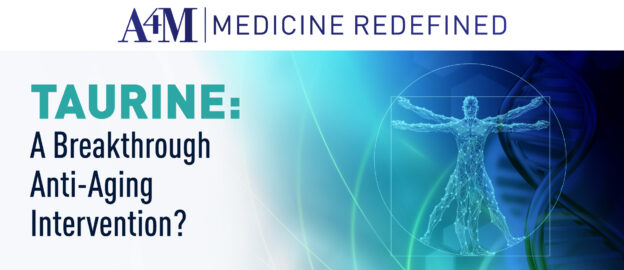Aging brings forth many physiological changes across various levels, from organelles to organ systems. The process and potential to slow it down have captivated the scientific community prompting a substantial rise in research to enhance our understanding of aging as a biological phenomenon. As advancements in medical research continue to uncover potential interventions for promoting longevity, a new avenue has emerged as particularly promising: taurine supplementation.
Taurine Deficiency and Aging
Taurine, one of the most abundant amino acids in humans, plays a vital role in various physiological processes. It contributes to bile acid conjugation, facilitates osmoregulation, and is essential to antioxidant defense mechanisms. However, the amount of taurine in circulation declines with age, and recent studies suggest that taurine deficiency is a significant driver of aging in mice, worms, monkeys, and potentially humans.
Taurine Supplementation for Longevity: What the Science Says
A recent study conducted by Singh et al. and published in Science investigated the effect of taurine supplementation on life- and healthspan in various species, including mice, monkeys, worms, and yeast. To determine whether age-related declines in taurine blood concentration contribute to aging, the researchers administered either taurine or a control solution once daily to middle-aged, wild-type female and male C57B1/6J mice until the end of their lives.
Remarkably, the results showed that taurine-fed mice of both sexes survived longer than the control group, with the former’s lifespan increasing by 10-12% and life expectancy at 28 months jumping by 18%-25%.
Delving deeper into the compound’s effects on longevity, the study also reported that taurine supplementation improved bone, muscle, pancreas, brain, gut, metabolism, and immune function in middle-aged mice. Similar results were observed in monkeys.
Concerning taurine’s impact on key aging markers, the study’s findings also revealed that supplementation reduced cellular senescence, protected against telomerase deficiency, suppressed mitochondrial dysfunction, decreased DNA damage, and attenuated inflammation.
Moreover, the study found that lower taurine, hypotaurine, and N-acetyl taurine concentrations were associated with numerous health conditions, including hypertension, obesity, inflammation, and type 2 diabetes.
Finally, the study’s authors found that exercise increased blood concentrations of taurine metabolites – which further validates the current evidence supporting exercise as an anti-aging intervention.
The study’s findings provide compelling evidence for taurine as an essential longevity factor; however, there is currently no evidence that these benefits translate to humans.
Taurine Supplementation: Risks vs. Benefits?
As with any dietary supplement, taurine comes with its own set of risks and benefits. While scientific evidence supporting the use of taurine in humans remains sparse, it is crucial for health practitioners discussing taurine supplements to be aware of these factors and weigh them against each other to ensure patient safety.
Benefits:
- Anti-Aging Effects: Taurine has shown promise in slowing the aging process, potentially extending life- and healthspan.
- Cardioprotective Properties: The amino acid has been associated with improved cardiovascular health, including reduced risk of heart disease and enhanced heart function.
- Antioxidant Activity: Taurine acts as an antioxidant in the body, protecting cells from oxidative stress and potentially reducing the risk of age-related conditions.
- Neuroprotective Benefits: Research has shown that taurine may support brain health and have neuroprotective properties, potentially reducing the risk of age-related cognitive decline.
Risks:
- Allergic Reactions: Some patients may experience allergic reactions to taurine supplements. Symptoms to be aware of include skin rash, trouble breathing, facial swelling, and anaphylaxis.
- Interaction with Medications: Taurine may interact with certain drugs, such as antihypertensive, antidepressant, antiepileptic medications, and lithium. Additionally, mild interactions have been reported between the supplement and 35 different drugs.
- Side Effects: Despite claims that taurine has no adverse side effects when supplemented appropriately, some patients have reported vomiting, nausea, liver pain, headache, and stomach pain. In such cases, the symptoms should be monitored, and supplementation should be adjusted accordingly.
Important Considerations in Clinical Practice
As patients explore the possibility of taurine supplementation, physicians play a crucial role in guiding patients toward optimal health. Their expertise can help individuals make informed decisions about incorporating taurine supplements into their lifestyle, considering their unique health circumstances and goals. Here are some frequently asked questions about taurine supplementation to take into account:
1. Is taurine supplementation safe?
Taurine is generally considered safe for most individuals when taken in appropriate doses. However, patients with underlying health conditions or those taking specific medications should be advised accordingly and monitored closely if starting taurine supplementation.
2. How much taurine should be taken daily?
The appropriate dosage of taurine varies depending on individual factors. However, current evidence suggests between 3-6 grams per day can be safely consumed for up to one year.
3. Can taurine supplements slow down the aging process?
While the research on taurine’s anti-aging benefits is promising, further studies are needed to fully understand its underlying mechanisms, potential benefits in humans, and long-term outcomes. However, the existing research suggests that taurine supplementation may positively influence lifespan and healthspan.
4. Are there any dietary sources of taurine?
Taurine is naturally present in certain foods, including meat, fish, and dairy products; it is also a common component of energy drinks and exercise enhancers. Additionally, the traditional Western diet includes between 40-400 mg of taurine per day. The taurine concentration in these sources may not be enough to experience therapeutic benefits. As a result, taurine supplements may be a more reliable way to increase intake levels.
Are taurine supplements the next breakthrough anti-aging intervention? Can supplementation lengthen lives or improve health? Only through well-controlled clinical trials can we find concrete answers to these critical questions.
While the current research on taurine supplementation is promising, further exploration is needed to fully understand its impact on human aging along with other important considerations, such as dosage requirements, safety precautions, and more. The true potential of taurine as a valuable tool in pursuing longevity continues to unfold, inspiring continued investigation and groundbreaking advancements in anti-aging.

